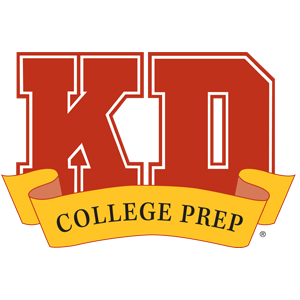Choosing the right time to take the ACT® or SAT® test can have a positive impact on your performance. You will need time to prepare beforehand, and you’ll want to settle on a date when you won’t be overwhelmed with extracurriculars, school work, or other factors.
Deciding on the best test date for you will depend on your personal situation, but here you’ll find general guidelines to consider before reserving your seat.
In What Grade Should I Take the ACT or SAT Test?
The answer: It depends! As a general rule, we typically recommend that a student finish testing by the end of 11th grade, but this advice changes depending on the student’s situation.
If you have finished the majority of your advanced math, science, and language arts classes by the summer before 11th grade, you might be ready to take the national test for the first time then. But maybe you have band practice or a family vacation that conflicts with the available test dates. There are several factors that impact your availability or level of preparedness.
A testing plan should be personalized to your specific needs. If you need advice about how to build the best testing plan for you, contact us to set up a free consultation with a member of our team.
When Can I Start Taking the ACT or SAT Tests?
While you can start taking the ACT or SAT test for college admissions as early as 8th grade, we typically recommend that students wait until 11th grade to take the test for the first time.
These college admissions tests evaluate your knowledge of everything you should learn throughout high school. If you take a test too early, you may score low because you haven’t yet had the chance to learn advanced concepts in your high school courses. Low scores can be discouraging, so it’s better to wait until you are ready.
If you want to become familiar with what a test day is like, you can always sign up for the PSAT starting in 8th grade. We also offer various practice tests through our test prep programs for 7th-12th graders.
Please note: The SAT and ACT tests are open to anyone, so students can technically take the test at a younger age. However, each college has certain guidelines on how recent a score must be for consideration. Most colleges won’t consider test scores older than five years.
Helpful Facts about ACT Test Dates
The ACT test is available several times throughout the year. Check out upcoming ACT test dates and registration deadlines. Below are a few quick facts about when to take the ACT test:
- In a normal year, the ACT test is offered seven times in the United States: February, April, June, July, September, October, and December (July test date is not available in New York).
- The ACT test is usually offered on a Saturday, but there is a Sunday test option for students who cannot test on Saturday due to religious reasons.
- Your school district may offer the option to take the ACT test during a school day. View the list of upcoming school day tests and ask your high school counselor about signing up.
- Due to the COVID-19 pandemic, there are limited seats available to take the ACT test. Remember to sign up early to secure your spot. Also keep in mind that all test dates are subject to change if the crisis worsens.
- Scores are usually available 2-8 weeks after you take the test. Find out when to expect your score report.
- You can take the ACT test as many times as you want. Colleges won’t penalize you for multiple attempts.
Helpful Facts about SAT Test Dates
For the most up-to-date list, take a look at upcoming SAT test dates and registration deadlines on the CollegeBoard® website. Below are some things to remember when choosing your SAT test date:
- In a normal year, the SAT test is offered seven times in the United States: March, May, June, August, October, November, and December
- The SAT test is usually offered on a Saturday, but there is a Sunday test option for students who cannot test on Saturday due to religious reasons.
- Your school district may offer the option to take the SAT test during a school day. View the list of upcoming school day tests and ask your high school counselor about signing up.
- Due to the COVID-19 pandemic, there are limited seats available to take the SAT test. Remember to sign up early to secure your spot. Also keep in mind that all test dates are subject to change if the crisis worsens.
- CollegeBoard is discontinuing SAT Subject Tests and the optional essay.
- Scores are usually available 2-3 weeks after you take the test. Find out when to expect your score report.
- You can take the SAT test as many times as you want. Colleges won’t penalize you for multiple attempts.
5 Quick Tips for Choosing Your Best Test Date
1. Give Yourself Time to Prepare
A college admissions test is not a pop quiz! You have the ability to plan when you’ll take the ACT or SAT test, and with that power you can set aside time to prepare (Trust us, you’ll thank yourself later).
It’s never a good idea to wait until the last minute to study for a test. At the same time, it can be a challenge to know what you should be studying, how often, and how to effectively practice the concepts you’ll find on the test.
Since 1992, KD College Prep has helped students prepare for the ACT, SAT, and PSAT tests. We offer flexible schedules for our test prep classes that students can attend in person or online. One-on-one tutoring is also available for students who need to work directly with an instructor to master certain areas on the tests.
2. Test When You Are Ready
It is possible to test too early. If you test before you are ready, you may receive a low test score and start to doubt your abilities.
At the beginning of high school, most students haven’t yet had the time to master key concepts found on the tests. Give yourself time to learn in your high school classes, attend test prep classes, and take practice tests. Make your first attempt on the test a solid one. That way you can go back, evaluate your performance, and identify key areas in which you can improve.
3. Find an Available Window
When it’s time for you to take the tests, you want to eliminate as much stress as possible. Find a free window in your schedule where you’ll have more time outside of school to focus on the tests.
We know that finding the perfect window can be a challenge. As a high school student, you’re probably juggling challenging school work, extracurriculars, and maybe even a part-time job. Luckily, our directors can help you build a testing plan that will work best for you.
4. Allow Time to Retake the Tests
You may not reach that target test score on the first go-round. And that’s okay! As long as you allow time to take the test a second (or third) time, you should be fine.
You can retake the tests as many times as you want! Colleges won’t penalize you for multiple attempts, and some will even use superscores to determine your acceptance.
When you receive your score report, delve into the details and identify areas in which you can improve. Then practice as much as you can. Through our test prep programs, we offer instructor-led workshops that zone in on the most challenging areas on the tests. You can also take as many practice tests as you need to get to your best score possible.
5. Finish Testing Before 12th Grade
As mentioned before, we often recommend that students finish testing by the end of 11th grade. Why? Because as a senior, your focus should shift toward college applications.
The college admissions process is already stressful and time consuming, and if you add the taking a last-minute test to the mix, you may not arrive at the outcome you originally wanted. Plan ahead so that you have time to put your best foot forward when working on your college applications.
Test Date Recommendations for 11th Grade
The majority of students will take the tests in 11th grade. Here is a quick guide to choosing the best test date for junior year.
When Should 11th Graders Take the ACT Test?
The ACT® test has a somewhat more robust math section than the SAT® test, which makes it both more beloved and more feared, depending on the student’s preferences. Students should plan to take the test twice to maximize the chances of reaching their score goal.
Best ACT Test Dates for 11th Graders:
- First try: July, September, October, or December
- Second (or third) try: February, April, June, or July (at the latest)
When Should 11th Graders Take the SAT Test?
The SAT® test can be a great first testing experience because testers get slightly more time per question than on the ACT® test. Plus, there isn’t any math beyond Algebra II.
Best SAT Test Dates for 11th Graders:
- First try: August, October, November, or December
- Second (or third) try: March, May, June, or August (at the latest)
Fall Dates
For most students, it’s a good idea to take the test for the first time in the fall of your junior year. By then, most students have taken Algebra I, Algebra II, and Pre-Cal. If you are just starting Pre-Cal, this is still a good time to test for the first time because you can always test again in the spring (or summer).
Keep in mind that the PSAT test is also offered in the fall of your junior year. Some students may not want to take tests back to back. Fall can also be a busy time for extracurriculars, so choose a date during which you won’t be overwhelmed by obligations.
Spring Dates
If you don’t reach your target score in the fall, plan to take the test again in the spring. For some students, the beginning of spring is a great time to retest because extracurricular activity may have slowed down, and you’ve had more time to study for the tests. Some test dates also fall during spring break for many students.
However, the end of spring can get a little hectic with finals, spring sports, and AP® exams. Make sure to plan around these things.
Summer Dates
Students tend to perform very well on summer test dates because they have more time in their schedule. School is usually out by the time the first June test date arrives, providing more hours to study and prepare.
On the other hand, summer can be filled with other obligations, like vacations, summer camps, and training for fall sports. Students can also fall into a state of complacency and get lazy with their test prep. Find a date that works well with your summer schedule, and stay dedicated to improving your score.
Find Help Throughout the Process
At KD College Prep, our team of expert instructors and college counselors are here to guide you through the entire college admissions process. Whether you need help building a testing plan or advice on your college applications, we can help. Learn more about our test prep and college counseling programs.














































